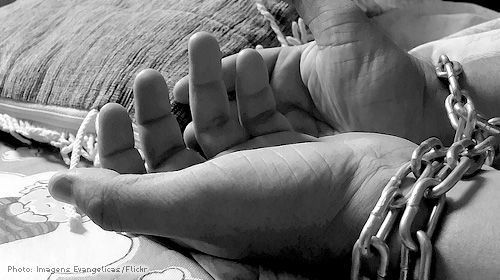U.S. Must Work to End Human Trafficking, Modern-Day Slavery on Government Contracts


In 2004, Buddhi Prasad Gurung, a young man wishing to provide a better life for his family, left his village in Nepal for Jordan, where local labor recruiters had falsely promised him work in five-star hotels and restaurants. Based on this promise, Gurung borrowed heavily to pay the recruitment fees he had been charged. Upon arrival, the lucrative jobs in the luxury hotels did not materialize. Instead, his passport was seized, and he was transported against his will to Iraq to work for a U.S. government subcontractor called Daoud & Partners. En route to the military base – on a dangerous highway with no security – the convoy in which he was traveling, along with dozens of men in identical predicaments, was attacked by Iraqi insurgents. Twelve of the men in the convoy were later executed, their deaths broadcast on television. Gurung was refused permission to return home for another 15 months by Daoud and the prime contractor, Kellogg, Brown, and Root, Inc. (KBR).
In one of the first cases against a corporation under the Trafficking Victims Protection Act (TVPA), , Gurung and the families of the Nepali victims sued KBR and Daoud in federal court for trafficking and forced labor, and the ACLU this week filed an amicus brief in support of the men.
What happened to these men was a horrific tragedy, but the circumstances leading up to their deaths are sadly not unique. As the ACLU and Yale Law School's Allard K. Lowenstein International Human Rights Law clinic documented in Victims of Complacency, a report published in 2012, since 2003 thousands of foreign workers (known as Third Country Nationals or "TCNs") hired to work on U.S. government contracts in Iraq, Afghanistan and elsewhere have been subjected to similar abuses, which taken together constitute a scheme of human trafficking for forced labor.
In a filing last year, KBR sought dismissal of the case, arguing that the victims were not actually subjected to trafficking or forced labor and that regardless, it is shielded from liability under the TVPA. As our brief makes clear, KBR's position flies in the face of the text, purpose, and context of the TVPA. KBR's actions unquestionably constitute trafficking under both U.S. and international law, and KBR can – and must – be held liable for these violations. As we argue:
For this Court to accept the arguments advanced by KBR would mean that no entity in KBR's position could ever be legally liable for trafficking or forced labor under the TVPRA. This would be an erroneous reading of the statute, and a significant impediment to congressional efforts to eradicate the scourge of trafficking and forced labor from the government contracting process.
Though the abuses these men suffered have been well known for over a decade, the U.S. government has only recently begun to take measures to eliminate this form of modern-day slavery from the government contracting process. In September 2012, the Obama administration signed an Executive Order setting out new requirements to prevent trafficking and forced labor of anyone serving under government contracts. In January this year, Congress codified many of these protections in the . To certify that these words are translated into action, the ACLU and a number of anti-trafficking organizations this month submitted a written statement to the Federal Acquisition Regulatory (FAR) Council recommending the adoption of standards critical to ensuring better oversight in the contracting process. We hope this lawsuit and the new regulations will ensure that the U.S. government contracting process is no longer complicit in modern-day slavery.
Learn more about human trafficking and other civil liberty issues: Sign up for breaking news alerts, , and .

